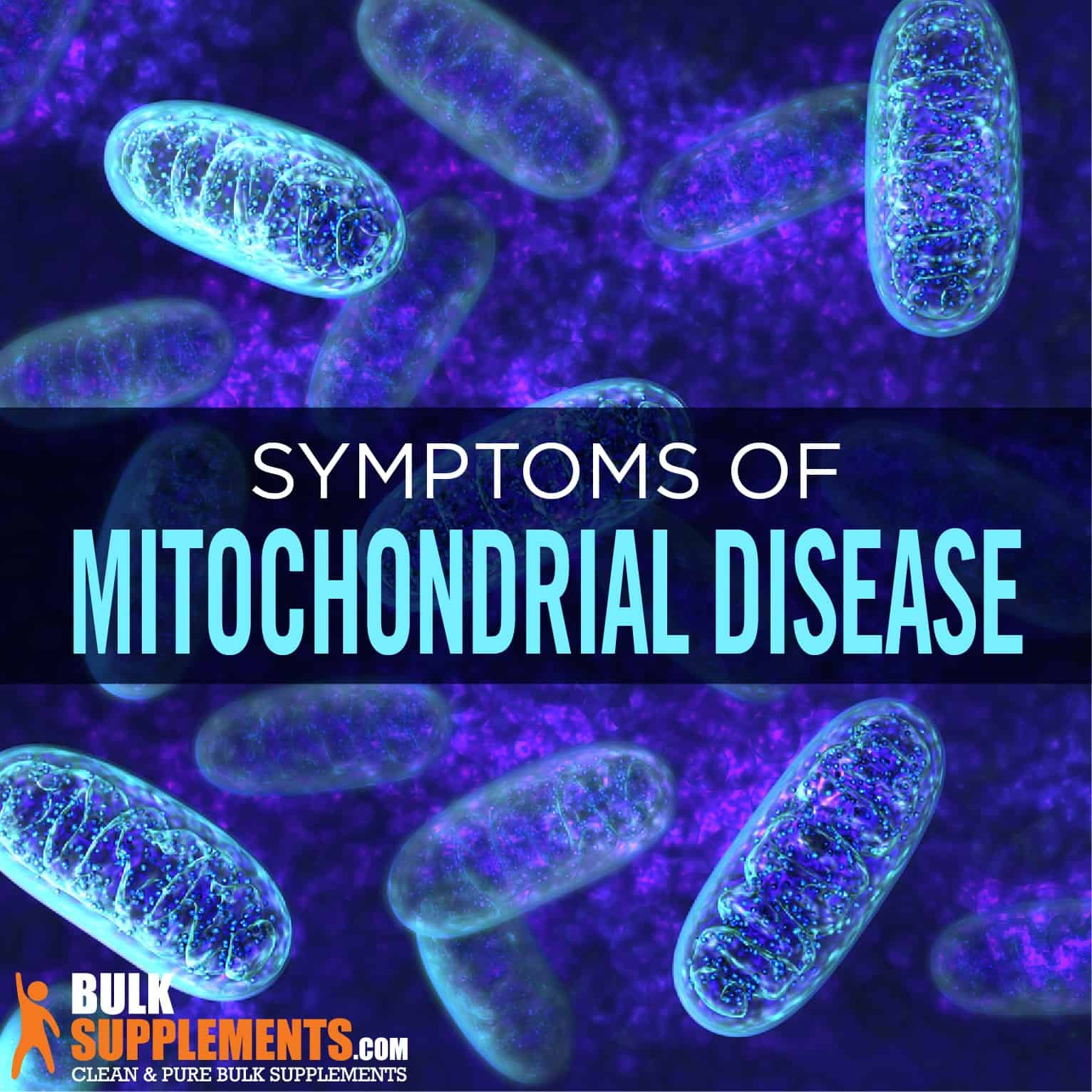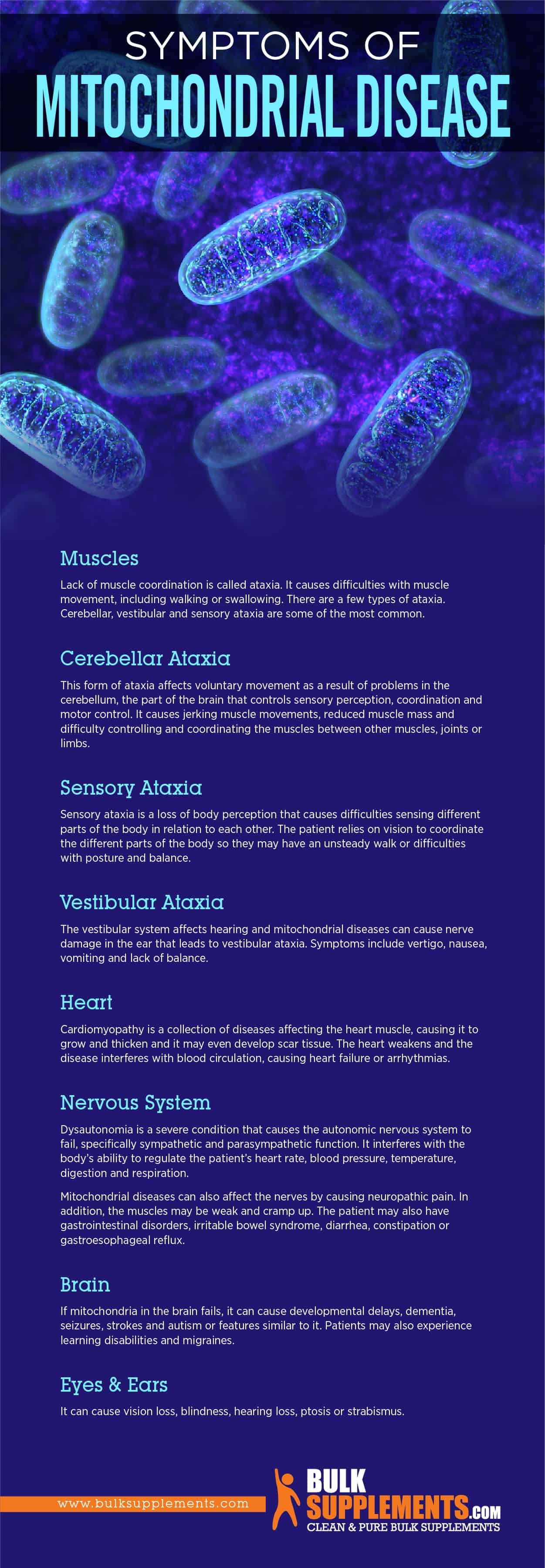Mitochondrial Diseases: Symptoms, Causes & Treatment
by James Denlinger Digital Marketing Strategist
What is a Mitochondrial Disease?
The mitochondria are the factories of power in the body’s cells and they are vital for life. However, if they begin to fail, the organs get less and less power and begin to shut down. Mitochondrial diseases can lead to complete organ failure. It affects the body’s big power users the most, such as the heart, the brain and the muscles (x). The mitochondria are also very involved in metabolic processes in the body and they perform different functions in different cells. For example, mitochondria contain enzymes that the body needs to create hemoglobin and they also help detoxify the liver.
A mitochondrial disease is a genetic condition, so it can appear at birth or later in life. If the condition is present at birth, it can lead to problems in the child’s development, interfere with muscle growth and cause other health complications. The condition develops as a result of another condition that interferes with mitochondrial function.
Symptoms of Mitochondrial Diseases
Mitochondrial diseases affect three or more organ systems. This can make the condition hard to identify and patients may experience different symptoms in different organs—the muscles, heart, nervous system, brain, eyes and ears.
Muscles
Lack of muscle coordination is called ataxia. It causes difficulties with muscle movement, including walking or swallowing. There are a few types of ataxia. Cerebellar, vestibular and sensory ataxia are some of the most common.
Cerebellar Ataxia
This form of ataxia affects voluntary movement as a result of problems in the cerebellum, the part of the brain that controls sensory perception, coordination and motor control. It causes jerking muscle movements, reduced muscle mass and difficulty controlling and coordinating the muscles between other muscles, joints or limbs.
Sensory Ataxia
Sensory ataxia is a loss of body perception that causes difficulties sensing different parts of the body in relation to each other. The patient relies on vision to coordinate the different parts of the body so they may have an unsteady walk or difficulties with posture and balance.
Vestibular Ataxia
The vestibular system affects hearing and mitochondrial diseases can cause nerve damage in the ear that leads to vestibular ataxia. Symptoms include vertigo, nausea, vomiting and lack of balance.
Heart
Cardiomyopathy is a collection of diseases affecting the heart muscle, causing it to grow and thicken and it may even develop scar tissue. The heart weakens and the disease interferes with blood circulation, causing heart failure or arrhythmias.
Nervous System
Dysautonomia is a severe condition that causes the autonomic nervous system to fail, specifically sympathetic and parasympathetic function. It interferes with the body’s ability to regulate the patient’s heart rate, blood pressure, temperature, digestion and respiration.
Mitochondrial diseases can also affect the nerves by causing neuropathic pain. In addition, the muscles may be weak and cramp up. The patient may also have gastrointestinal disorders, irritable bowel syndrome, diarrhea, constipation or gastroesophageal reflux.
Brain
If mitochondria in the brain fails, it can cause developmental delays, dementia, seizures, strokes and autism or features similar to it. Patients may also experience learning disabilities and migraines.
Eyes & Ears
It can cause vision loss, blindness, hearing loss, ptosis or strabismus.

Causes of Mitochondrial Diseases
A mitochondrial disease is a chronic genetic disease and most of the time patients inherit it from their parents. The patient receives a mutated gene with a different genetic code that interferes with mitochondrial function. However, there are different ways that a mitochondrial disease passes from parents to their offspring—autosomal recessive inheritance, autosomal dominant inheritance, mitochondrial inheritance and random mutations.
In autosomal recessive inheritance, each parent contributes one mutated gene. The risk of developing a mitochondrial disease is 25 percent because it is recessive. On the other hand, an autosomal dominant inheritance produces a 50 percent chance because the child receives the dominant mutated gene from only one parent. Mitochondrial inheritance is a unique type in which the mutation is in the mitochondria themselves. Offspring can only inherit this trait from their mothers. However, in some cases the mutation is not inherited from a parent. Instead the genes just mutate on their own, resulting in a random mutation.
Treatment for Mitochondrial Diseases
Different patients may require different treatment methods depending on their specific condition. There is no cure for this disease, but there are ways to treat some of the symptoms and help the patient manage them. Doctors usually aim to address the symptoms since they cannot treat the genetic mutation.
Supportive Therapy
Doctors may recommend exercise and physical therapy to increase muscle mass, since mitochondrial diseases reduce muscle strength and function. Patients may also benefit from speech therapy or respiratory therapy to help improve the patient’s function.
Diet
In some cases, doctors recommend nutrition therapy for patients with mitochondrial diseases. Specifically, research shows that the Ketogenic diet may be an effective way to help manage symptoms. It may increase mitochondrial biogenesis and help provide energy to the mitochondria. In addition, ketosis may help the mitochondria function better to reduce inflammation and oxidative stress.
Avoid Toxins
Alcohol and cigarettes can make the condition progress faster. Specifically, cigarette smoke contains carbon monoxide, which can cause damage to the body and accelerate several different health conditions including mitochondrial diseases.
Manage Physiological Stress
There are several different factors that can cause physiological stress and interfere with the body’s metabolism. Patients may have specific factors that trigger physiological stress. Identifying these triggers can allow the patient to avoid them, which may help them manage the condition better. For example, cold stress and heat stress may be abnormal in patients with mitochondrial diseases. The body may not be able to regulate temperature properly. If the body loses severe amounts of heat, it can trigger heat exhaustion or heat stroke. Cover all exposed body parts in the cold and avoid direct sunlight on hot days. Stay inside on hot days in an air-conditioned environment.
Supplements for Mitochondrial Diseases
Physicians may recommend dietary supplements to make sure the patient gets certain vitamins that regulate chemical reactions to produce energy in the body. Most people get enough nutrients from their diets, but patients with mitochondrial diseases may need to supplement these nutrients. However, supplements will not treat mitochondrial diseases. Instead, they may only help improve body functions. Consult a doctor for approval before starting a supplement regimen.
Coenzyme Q10
Coenzyme Q10 can function as a part of the mitochondrial electron transport chain as a shuttle. In fact, one of its main functions is to transport materials around the mitochondria. CoQ10 deficiency can cause muscular and neurological dysfunctions that supplementation may improve, according to research. As a dietary supplement, the recommended dosage for CoQ10 powder is 50 to 200 mg once a day.
Riboflavin (Vitamin B2)
Riboflavin is a key factor in mitochondrial processes, specifically in energy creation. It helps increase mood and energy levels in the body because it improves metabolism. It may also reduce fatigue, anxiety and depression. As a dietary supplement, take riboflavin (vitamin B2) powder in 50 mg doses once or twice a day.
Creatine
Creatine is a nonessential amino acid that the body produces in the liver, kidneys and pancreas. It is comprised of the amino acids glycine, arginine and methionine. It helps store glycogen in the body to use as energy and creatine deficiencies can also reduce muscle mass. The recommended dosage for creatine monohydrate powder is 2,500 to 5,000 mg once a day with water. Do not use it with caffeine. It may cause muscle cramps and dehydration.
The Bottom Line
Mitochondrial diseases result from other conditions that interfere with mitochondrial function. Usually they affect at least three different symptoms in the body, such as the heart, the nerves, the nervous system, the muscles and the brain. It may cause heart diseases that affect the heart muscle, vision loss, hearing loss or gastrointestinal disorders. Patients may also lack the ability to control the muscles and coordinate movement.
Mitochondrial diseases are a genetic condition, usually passed from parents to their offspring. There are different ways the condition transfers but it is a result of a genetic mutation. Treatment options include supportive therapy, dietary changes and physiological stress management. Patients may also take supplements to help metabolic processes in the body, with a doctor’s permission. Supplements are not a cure for mitochondrial diseases, but they may help support the body and improve health.
Sponsor Ads
Created on Mar 1st 2020 21:28. Viewed 313 times.



